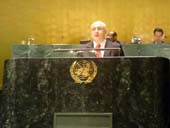30 years on from its discovery, World is working hard to combat AIDS
Monday, June 13

A three-day special session of the United Nations General Assembly was attended by 30 heads of state and ministers from 100 nations. Georgia's delegation also attended the session.
Vice Speaker of the Parliament Gigi Tsereteli lead the Georgian delegation at UN General Assembly session held on June 8-10.
In his speech Tsereteli outlined the work the Georgian government does to further accelerate the progress made in the national HIV/AIDS response.
“Although we have not witnessed a wide scale epidemic of HIV, still approximately 2900 cases have been registered officially while the estimated number is about 4000. The growth of the epidemic in the country has been relatively slow. Yet, the incidence of HIV infection has exceeded the average rate of the European Union,” Tsereteli said.
Tsereteli also talked about Georgia’s two occupied regions Abkhazia and South Ossetia and said that Georgia welcomes the recent UN Security Council resolution on HIV prevention, treatment, care and support in conflict zones. “We hope the international community will act more decisively to ensure the provision of corresponding mechanisms in the two occupied regions of Georgia,” he said.
According to Tsereteli the National Strategic Plan of Action has been in place since 2003. In 2009, the Georgian Parliament adopted the new law on HIV/AIDS, which endorses a rights-based approach to fighting the epidemic. However, along with successes, the national AIDS response is challenged by financial constraints to sustain the progress, especially after the current Global Fund assistance is withdrawn. Despite the heavy human, social and economic impact following the Russian invasion of 2008, the Georgian Government put all possible efforts to sustain the leadership and increase domestic funding allocations in subsequent years. However, within the limited fiscal capacity of the country, support from international community remains critical.
“My country has made substantial progress in responding to the HIV epidemic. Nevertheless, increased efforts are needed to meet the MDG goal 6 to halt and reverse the spread of the epidemic by 2015. Guided by the WHO Global Health Sector Strategy on HIV/AIDS, Georgia has defined early identification and treatment of HIV cases as future priority, which represents the most promising approach to eliminate the epidemic,” he said.
